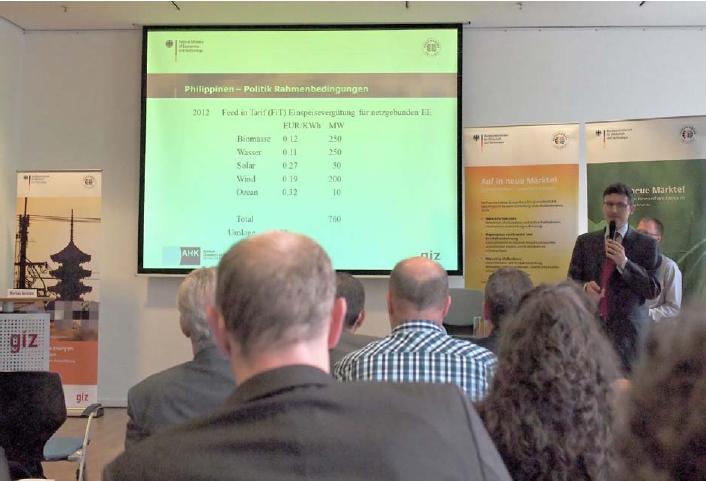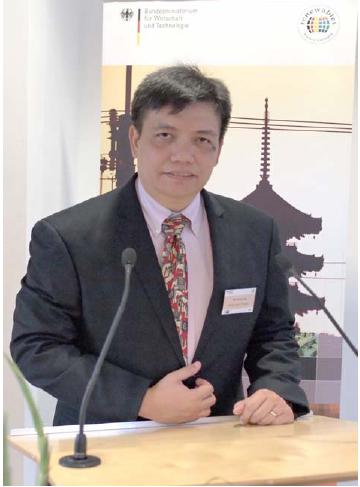Berlin. 29 June 2012.
The GIZ, or the Deutsche Gesellschaft fur Internationale Zusammenarbeit, conducted on 28 June 2012 a one-day workshop on “Energy from Biomass and Biogas in the Philippines“.

Mr. Markus Dietrich of ASEI Inc. Philippines gives an outline of the political framework conditions for the Philippine energy sector.
The workshop sought to familiarize German renewable energy companies on the challenges and opportunities in the biogas and biomass industry of the Philippines. Twenty five entrepreneurs and consultants from the German biogas, biomass, and biofuel sectors attended the workshop to listen to market entry conditions and project opportunities in the Philippines.

Mr. Bert Dalusung of the Biomass Alliance answers questions about the framework conditions for market entry, economic potential and specific business opportunities in the Philippines.
Speakers from the Philippines included Mr. Albert Dalusung, Vice President of the Biomass Renewable Energy Alliance, who shared information on potential cooperation partners and current bioenergy projects in the Philippines. Mr. Dalusung informed German investors that local governments are particularly supportive of biogas / solid biomass electricity generation, especially in municipalities where there are abundant biomass feedstock and animal waste for biogas.

Mr. Paul Thomas Puthenpurekal of SURE Inc. answers questions about the framework conditions for market entry, economic potential and specific business opportunities in the Philippines.
The other speaker was Mr. Paul Thomas Puthenpurekal, President and COO of Solutions Using Renewable Energy (SURE) Inc., who shared his experiences on how biogas projects are managed in the Philippines, as well as the demand for biomass/biogas technology in the country. His company, SURE Inc., has vast experience as a renewable power project developer in Southeast Asia.
Though the Philippines remains highly dependent on fossil fuels for its energy supply, there is now a growing local interest to pursue renewable sources of energy not just as a sustainable energy alternative, but also as a potential source for job creation in the Philippine countryside. In the area of bioenergy, there are very good opportunities to build business partnerships between foreign and local partners in the Philippines that cover the entire value chain for the production and distribution of energy from biogas and biomass.
The German Federal Ministry of Economics and Technology (BMWi) and its operational arm, the GIZ, has been working closely with local agencies and the private sector in promoting development cooperation in the Philippines.
The GIZ operates on behalf of the BMWi, as well as other German ministries such as the Federal Foreign Office, the Federal Ministry for Economic Cooperation and Development and the Federal Ministry for the Environment, in developing markets and in setting up structures and developing capacity for good governance with partner countries such as the Philippines.
The Philippine Embassy in Berlin has been working closely with the GIZ and concerned federal ministries, as well as with the European Chamber of Commerce of the Phiilppines and the German-Philippines Chamber of Commerce and Industry, Inc. in pursuing business matching opportunities as well as to ensure that the Biomass Renewable Energy Alliance and other Philippine-based company representatives are able to learn more about German products and services, and the overall energy policy environment in Germany. (END)



